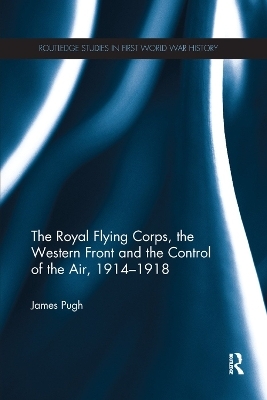
The Royal Flying Corps, the Western Front and the Control of the Air, 1914–1918
Routledge (Verlag)
978-0-367-27537-2 (ISBN)
By the middle of 1918 the British Army had successfully mastered the concept of ’all arms’ warfare on the Western Front. This doctrine, integrating infantry, artillery, armoured vehicles and - crucially - air power, was to prove highly effective and formed the basis of major military operations for the next hundred years. Yet, whilst much has been written on the utilisation of ground forces, the air element still tends to be studied in isolation from the army as a whole. In order to move beyond the usual 'aircraft and aces' approach, this book explores the conceptual origins of the control of the air and the role of the Royal Flying Corps (RFC) within the British army. In so doing it addresses four key themes. First, it explores and defines the most fundamental air power concept - the control of the air - by examining its conceptual origins before and during the First World War. Second, it moves beyond the popular history of air power during the First World War to reveal the complexity of the topic. Third, it reintegrates the study of air power during the First World War, specifically that of the RFC, into the strategic, operational, organisational, and intellectual contexts of the era, as well as embedding the study within the respective scholarly literatures of these contexts. Fourth, the book reinvigorates an entrenched historiography by challenging the usually critical interpretation of the RFC’s approach to the control of the air, providing new perspectives on air power during the First World War. This includes an exploration of the creation of the RAF and its impact on the development of air power concepts.
James Pugh is a Lecturer in Modern History at the University of Birmingham, UK. His research explores Modern British History in the era of the two World Wars. This includes the history of air power during both conflicts, and he has published on air power leadership and doctrine. His latest research explores the history of amphetamines in Britain between 1935 and 1945, which includes articles in the Journal of Contemporary History and War in History.
List of Illustrations
Series Editor’s Preface
Foreword
Acknowledgements
Abbreviations
1 ‘By attacking and by continuing to attack’: The Royal Flying Corps, the Royal Air Force and the Control of the Air over the Western Front – An Introduction
2 From Birth to Battle – The Royal Flying Corps and the Control of the Air, 1911 to 1914
3 ‘The essence of fighting in the air is to attack first’ – RFC Doctrine, Policy and Practice on the Western Front, August 1914 to November 1916
4 ‘An even more vigorous offensive’: The RFC and the Control of the Air on the Western Front, 1917 and 1918
5 Defending the Vigorous Offensive: The Control of the Air in Strategic, Political and Organisational Contexts, 1914–1917
6 A ‘kindred field of activity’: The Creation of the Royal Air Force, Air Defence, Independent Air Power and the Control of the Air, 1917–1918
7 ‘A serious war and a costly one’: The Royal Flying Corps, the Royal Air Force and the Control of the Air in the First World War and Beyond – Conclusion
Bibliography
| Erscheinungsdatum | 24.04.2019 |
|---|---|
| Reihe/Serie | Routledge Studies in First World War History |
| Zusatzinfo | 11 Tables, black and white; 7 Halftones, black and white |
| Verlagsort | London |
| Sprache | englisch |
| Maße | 156 x 234 mm |
| Gewicht | 312 g |
| Themenwelt | Geisteswissenschaften ► Archäologie |
| Geschichte ► Allgemeine Geschichte ► Neuzeit (bis 1918) | |
| Geisteswissenschaften ► Geschichte ► Regional- / Ländergeschichte | |
| Geschichte ► Teilgebiete der Geschichte ► Militärgeschichte | |
| Technik ► Fahrzeugbau / Schiffbau | |
| Technik ► Luft- / Raumfahrttechnik | |
| Technik ► Umwelttechnik / Biotechnologie | |
| ISBN-10 | 0-367-27537-6 / 0367275376 |
| ISBN-13 | 978-0-367-27537-2 / 9780367275372 |
| Zustand | Neuware |
| Haben Sie eine Frage zum Produkt? |
aus dem Bereich


